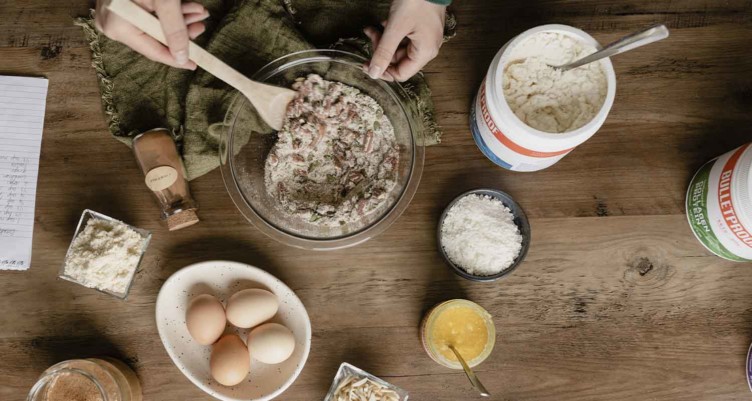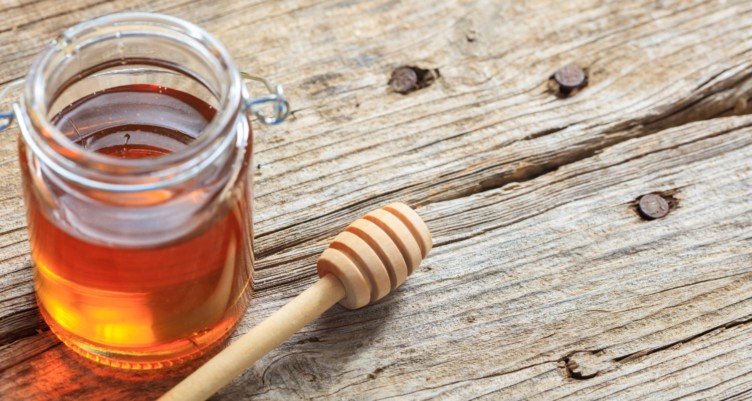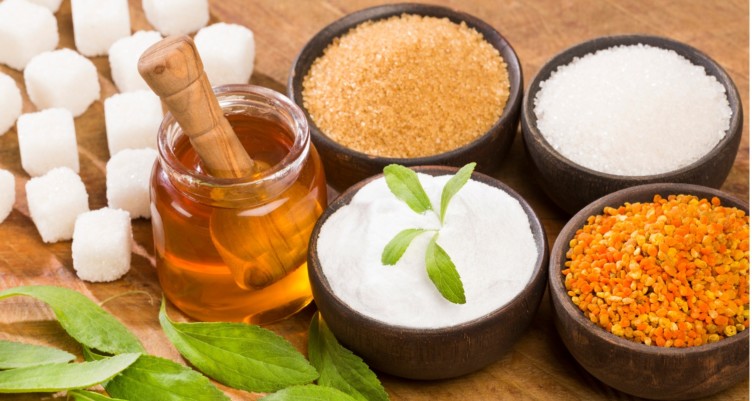Baking With Sugar Substitutes 101: Everything You Should Know

- Natural sweeteners can have less of an impact on blood sugar (compared to refined sugar), which can be beneficial for your health.
- Different types of sweeteners present unique variables when substituted for sugar in baking.
- Not in the mood to bake? Bulletproof offers snacks and sips with keto-friendly, low-glycemic sugar substitutes.
Baking with sugar substitutes isn’t as simple as using equal amounts in place of regular sugar. In fact, the standard sweetener-to-sugar ratio can sometimes lead to the crystallization of your baked goods. So, when making substitutions, you must account for texture and volume, which can also throw off cooking time.
For health-conscious bakers, it can be challenging to find the best sugar substitutes in the right amounts that won’t ruin your recipes. For example, natural sweeteners like stevia and xylitol may be better choices than sugar, but how do you bake with them? Continue on to find out!
Understanding sugar substitutes

All in all, baking with low-glycemic sweeteners that are new to you is no easy feat. “Warm up to experimentation and address every recipe individually,” says chef Vanessa Musi. “Some ingredients create structure, some bind. You have to get a feel for it.”
With the popularity of keto and low-carb diets, it’s important to know which is the best sugar substitute, and which to avoid—entirely.
Sugar substitutes to avoid
Throw “sugar substitutes” into a Google search and there’ll be no shortage of page results. However, there are some that you should keep scrolling on by, including artificial sweeteners like aspartame and sucralose. These are synthetic sugar substitutes and often have an offputting aftertaste due to the chemical content.
Additionally, it’s important to note that agave nectar is a plant-based sweetener to avoid. Although it has a low GI index, which doesn’t spike your blood sugar, it is high in fructose.[1]
To illustrate, sucrose, or table sugar, is 50% glucose and 50% fructose. Your liver is the only organ that can break down fructose in large amounts, which can lead to long-term health concerns.[2]
What about honey?

While honey does contain carbohydrates, it has health-boosting antioxidants and makes a great sweetener to have in small amounts, especially when following the paleo diet.
Note that diabetics (and those who follow a low-carb diet) should avoid raw honey, altogether, as it possesses a high glycemic index. However, if your diet allows for honey, remember to reduce the overall liquids in your recipe if you are substituting raw honey for sugar. For one cup of sugar, use 3/4 cup of honey, then reduce your wet ingredients by 1/4 cup.
Pro tip: Raw honey retains more nutrients than cooked honey, so utilize honey as your sugar substitute in no-bake desserts. However, due to the risk of infant botulism in young children, raw honey should never be given to children under 1 and might even be better held off on until they are 2 years of age.
Opting for natural, low-glycemic sugar substitutes
There are many natural sugar substitutes that come from whole-food sources you should consider adding to your low-sugar or sugar-free eating plan. These sugar substitutes are great swaps for refined sugars, in terms of comparable flavor and their impact on your body. Unfortunately, refined sugar, which is white sugar, gets digested quickly. And over time, that’s a recipe for insulin resistance and weight management issues.
Low-glycemic natural sweeteners, on the other hand, don’t spike your blood sugar the same way…
Baking with the right sugar substitutes

So, which is the best sugar substitute to use for low-glycemic brownies, cookies, cakes and more? Baking with erythritol and xylitol are two options that don’t give you that quick rise in blood sugar like white sugar does. Additionally, baking with monk fruit and stevia are zero-glycemic options that are popular in the sugar-free and keto communities. Baking with sugar substitutes can also open up a whole new world, which goes well with a variety of diets.
When it comes to the right low-glycemic natural sweetener swap, it’s all about personal preference. Take into consideration what you’re baking, as well as your health goals.
Ready to find your ideal low-glycemic sugar substitute? You can choose from:
- Erythritol: When baking with erythritol, use no more than ½ cup per recipe to avoid crystallization and dryness. Erythritol is best for same-day recipes, as there can be a cooling effect to the sweetness after more than one day. Keep in mind that pure erythritol contains about 60%-80% of the sweetening power of sugar.[3]
- Monk fruit extract: Pure monk fruit extract is 100 to 250 times sweeter than sugar,[4] but does not bake well in its purest form. Use it to sweeten a fat bomb, panna cotta, gelatin or any raw dessert—any time where you don’t need a lot of sugar for texture in a cold application. Note that some mainstream brands typically pair monk fruit with erythritol. (Baking with monk fruit and erythritol combinations are great for sugar-free sweets.)
- Stevia: Stevia is complementary when baking with berries, in particular, and high temperatures do not affect its sweetening properties. While stevia doesn’t provide the same texture as sugar, it is one of the best sweeteners to bake with. However, keep in mind that a little goes a long way: stevia is 200 to 300 times sweeter than refined sugar.[5]
- Xylitol: Be mindful of your sensitivity to xylitol, as it’s not easy for all to digest. It bakes well for those who can tolerate it, does not caramelize and tastes delicious. Xylitol is a good candidate to use in combination with other sweeteners, too. Remember, xylitol is toxic to dogs, so keep it (and all baked goods containing it) out of Fido’s reach!
- Inulin: Derived from chicory root, inulin is a plant-based fiber that has a mild sweetness. However, inulin powder is 10 times less sweet than sugar, which is important to note when calculating your ingredients.
Easy, low-glycemic Bulletproof dessert recipes

Now that you’re well-versed in the different types of low-glycemic natural sweeteners and how to use them, it’s time to put your baking skills to the test! From chocoholics to lemon lovers, we’ve rounded up some of our favorite recipes. Try your hand at five of the easiest and most satisfying guilt-free Bulletproof desserts!
1. No-Bake Protein Brownie Bites
Wait a minute… No refined flour or sugar in a chocolatey brownie bite? It’s true! Plus, these confections come with 6g of protein. To finish, roll them in finely shredded coconut, nuts or seeds for additional quality fats.
Pro tip: Pro tip: Use your favorite lower-sugar option made with high-quality dark chocolate.
2. Coconut and Lemon Sugar Cookies
You can use the sugar substitute of your choice in these rich, tart delights. Enjoy some added sweetness (and get those quality fats in), thanks to a Bulletproof Brain Octane C8 MCT Oil-based royal icing drizzle.
3. Coffee Panna Cotta
The perfect coffee-infused dessert, this panna cotta can be made with brewed coffee and Bulletproof Collagelatin to thicken this chilled concoction. Amp up the flavor by topping the finished product with a sugar substitute of your choice, along with cinnamon, toasted coconut or vanilla.
4. Lemon Drizzle Cake
Another bright and refreshing lemon treat in cake form, this recipe contains no grains and is made with Bulletproof Unflavored Collagen Protein to give you a healthful treat. While the ingredients call for maple syrup, you can make the swap to honey (for paleo) or another keto-friendly liquid sweetener of your choice.
5. Tres Leches Cake
This classic Latin dessert is now keto-friendly. The delectable cake soaks up sweetness and flavor from brown monk fruit and coconut cream. As an added bonus, reap the benefits of quality fats and protein from this dessert, thanks to the additions of Bulletproof French Vanilla Creamer and Bulletproof Vanilla Bean Energy Collagen Protein.
Related: Keto Desserts That’ll Satisfy Your Sweet Tooth
Bulletproof products that’ll curb your cravings
Don’t want to bake, but still craving a sweet treat? Bulletproof products are always made with natural sweeteners, from erythritol to stevia to inulin. Here are a few of our house favorites to satiate that sweet tooth:
- Collagen Protein Bars: Packed with 11g of protein and only 2g of sugar, these bars are low in net carbs and gluten-free. Each delicious bite contains grass-fed collagen to support healthy skin, bones and joints.† Enjoy a cookie-like taste that fuels like a protein bar, with no added sugar and ingredients you can feel good about.
- Bulletproof Collagen Protein: Hands down, the best part about Bulletproof Collagen Protein is that it dissolves seamlessly not only into beverages (Keto Hot Chocolate, anyone?), but baked goods, too—try these Collagen Breakfast Cookies, which feature Vanilla Collagen Protein! Seeking sustained energy benefits? Ramp up your collagen intake with Bulletproof Energy Collagen Protein, which features collagen, plus a Custom Energy Blend.
The bottom line: When you’re baking with sugar substitutes, it can be a trial-and-error process. Not all natural sugars react the same way when baking, plus some can be up to 300 times sweeter than regular sugar. (Yikes!) Try out several keto-friendly Bulletproof recipes to see how various sugar substitutes pair up with different dessert options. And, when you can’t find the time to bake, mindful sweet snacks from Bulletproof can help tackle your cravings.
Looking to cut down on those lengthier keto baking projects? Try these 17 no-bake keto desserts that are ready in no time!
Sign up for early access to sales, product launches, the latest Bulletproof news and more!
This article has been updated with new content.



